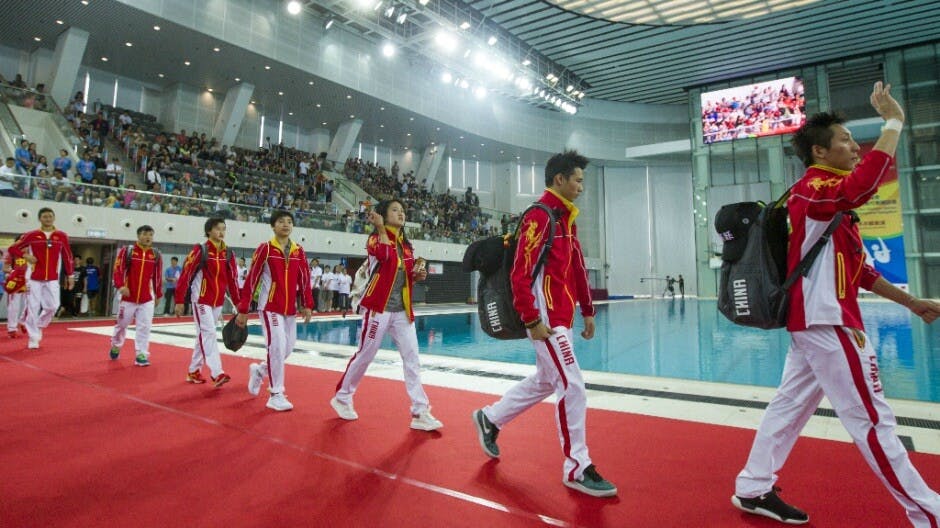The visit of mainland Olympic medalists has triggered the Hong Kong government to initiate a much overdue new sports policy — and definitely on a level playing field.
Although the Hong Kong Sports Institute (HKSI) was set up in October 2004 with the objectives of identifying talented sportsmen and women, achieving sports advancement in education and working with various sports association to promote sports development, the Home Affairs Bureau’s role remains to be strengthened in formulating a new and effective sports policy. Additionally, the Home Affairs Department should play a more proactive role in coordinating with various sports associations to achieve a new breakthrough.
First, the new sports policy must reassess whether the elite sport approach should be revamped. Traditionally, the government has been providing subsidies to the 16 sports that perform well in international competitions. But the end result was a vicious cycle since those sports that could not perform well in international competitions received insufficient financial support to develop. Further, the 16 elite sports do not appear to have achieved significant improvements in international competitions, except perhaps windsurfing and cycling. Hence, the government should reassess its assumptions on the elite sports policy’s effectiveness. Some people have argued that the scope of elite sport should be reduced so that fewer sports would receive larger financial support and hopefully perform better internationally. It is unclear whether the reduced elite sports would perform better, but some non-elite sports which did improve internationally, such as soccer, should receive more funding support.
Elite Sport, Mass Sport?
Other important questions include whether the division between elite and mass sport is an artificial barrier perpetuating the unbalanced development of sport, and whether the government should be more proactive in consulting with all local sports associations on how to develop a new and much better sports policy.
Second, the role of primary and secondary schools in formulating the new sports policy should be re-examined. They are the most fertile ground where talented young athletes can be identified and cultivated. Nevertheless, the government has not taken the initiative to actively single them out through such channels as inter-school competitions and the recommendations of sport teachers and school principals. Ideally, a triangular partnership should be established between the government, local sports associations and schools, with all working together to identify the most talented athletes in the first place, then arranging special and rigorous training for them at the territorial level, and providing opportunities for them to represent Hong Kong in international competitions.
Third, the HKSI’s role may be revamped to focus on the educational aspects of not only all the athletes but also the sport teachers and sports-related degree programs in Hong Kong. At present, the institute appears to shoulder the heavy responsibility of working in partnership with the government, the Sports Federation and Olympic Committee of Hong Kong, China (SFOC) and the national sports associations to provide an environment in which sports talent can be identified, nurtured, and developed to pursue excellence in the international sporting arena.
In fact, the government should set up a higher-level sports development committee, under the leadership of the secretary for home affairs, to coordinate with the SFOC and other sports associations. In this way, the HKSI would be able to devote its time to focusing on sports education, providing on-the-job training to all sports teachers at primary and secondary schools, developing new undergraduate and postgraduate degree programs that combine sports with other disciplines, such as science, psychology, education and public policy. The HKSI can play an intermediary role in working with secondary and primary schools to provide further training to talented students and sports teachers — yet another task not given much emphasis in recent years.
Fourth, all 18 district councils should be given more financial support so they can establish a new sports committee in each district to work with the HKSI and primary and secondary schools to promote sport development at the grassroots level. District councils should also be empowered to supervise the management of all sports facilities in their districts. Competitions in all sports should be reorganized under the umbrella of all 18 districts to further enhance organization of sport development as well as district identity.
Fifth, the Home Affairs Department must expand its role in coordinating our sport development. District officers must play a more proactive role in chairing the district management committees of all 18 district councils, ensuring that sports development can be promoted more effectively, energetically and strategically in every district. District officers should also be appointed to the higher-level new sports development committee to be chaired by the secretary for home affairs. The entire administrative structure responsible for sports development should be revamped so that Hong Kong will enter a new era of cost-effective sports policy.
Lastly, the Legislative Council should consider setting up a new sports committee that will scrutinize the work of the government in the formulating and implementing of the new sports policy.
We are authorised to republish the article from the China Daily (Asia).
(Cover photo: Eyepress)


































